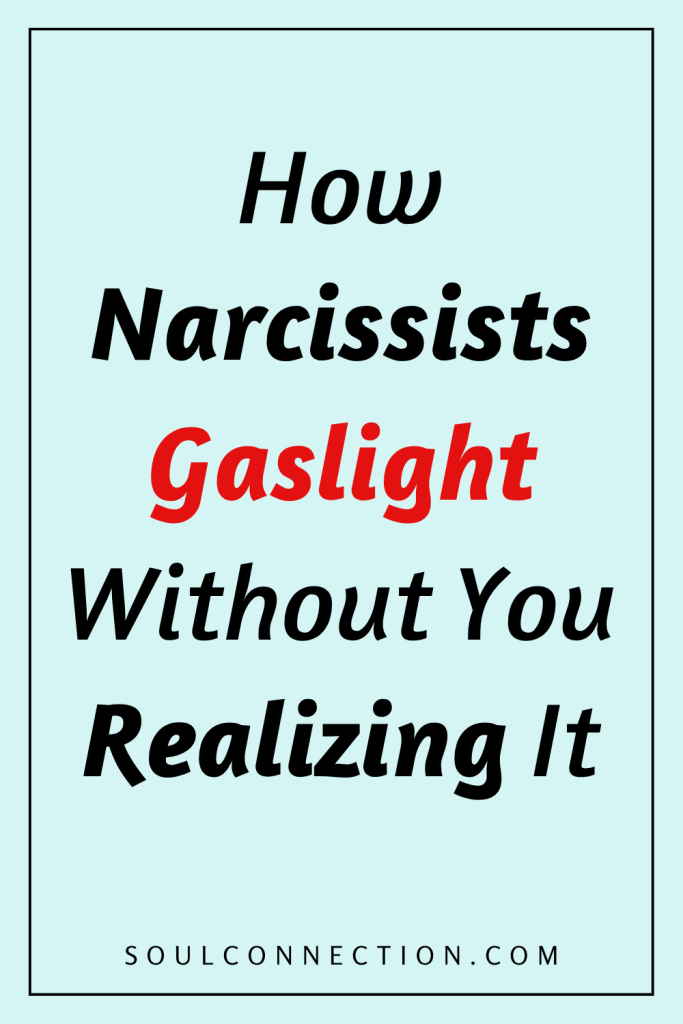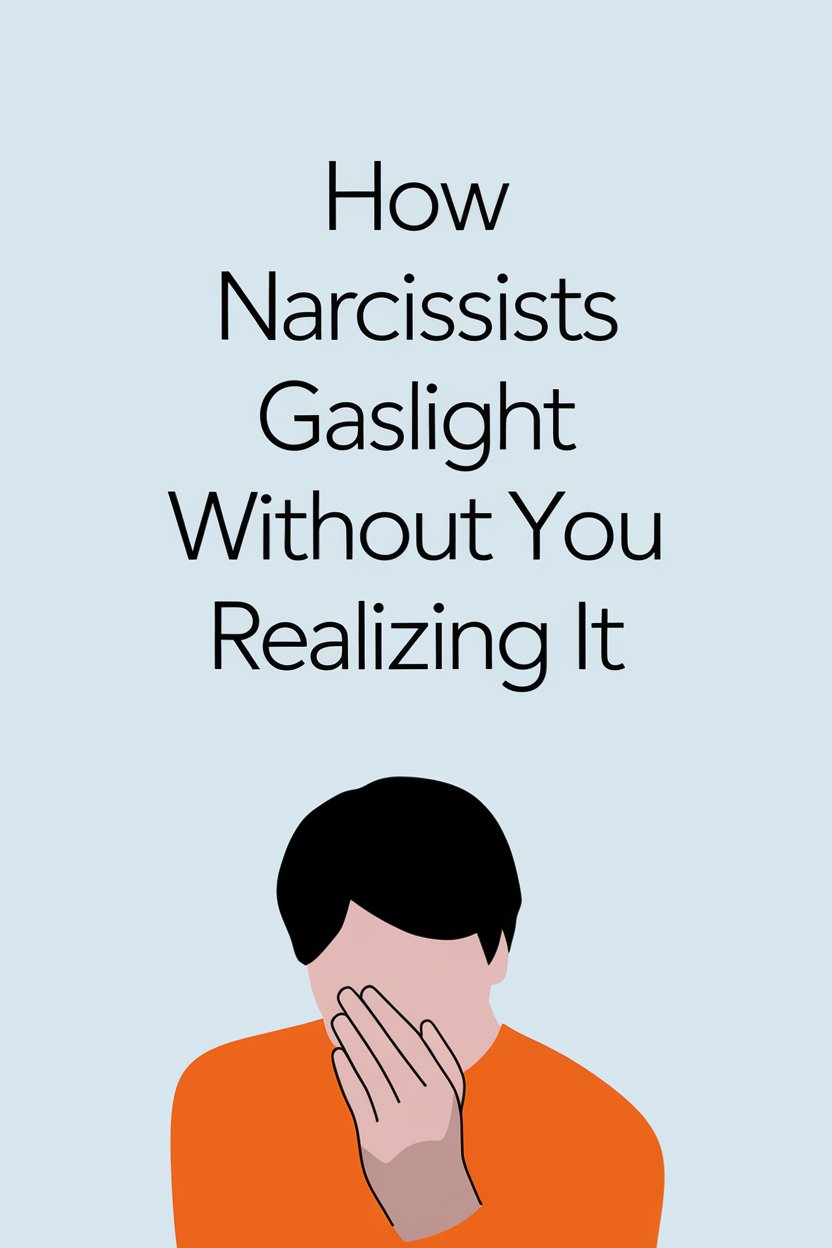If you’ve ever found yourself doubting your own memory, feelings, or downright sanity after a conversation with someone, chances are you’ve brushed up against the Olympic sport of gaslighting.
Narcissists, though, don’t just play—they coach, referee, and wear the uniform. And the worst part? They’re doing it while you’re still trying to locate the ball.
It’s one thing to spot gaslighting in a textbook. It’s another to see it play out in real time, under the radar, woven so smoothly into your relationship you’d swear it was all in your head.
Magic trick or emotional pickpocketing? Either way, time to call a spade a spade.
Subtle Shifts in the Narrative
It starts off so innocent. You mention a story, then suddenly, your narcissist-in-residence remembers it differently. Not just a little differently—wildly differently.
You recall a quiet evening in, but they swear you insisted on going out and made a scene in front of the neighbors. Funny how every memory seems to cast them as the long-suffering hero or the misunderstood genius.
At first, these memory tweaks feel like quirky differences in perspective. But over time, you realize the narrative always bends in their favor. Suddenly, you’re second-guessing whether you even remember your own life correctly.
Spoiler: You do. Your memory hasn’t started skipping—someone’s skipping the reel.
Rewriting Reality With Confidence
Ever seen someone tell a lie so convincingly you start to believe it might be true? Narcissists treat everyday realities like a choose-your-own-adventure novel.
They’ll say things with such absolute certainty that you start doubting your own senses. “I never said that,” or “You’re imagining things,” become standard responses.
The trick lies in delivery. Calm, measured tones, maybe a patronizing smile thrown in. If you protest, you’re “overreacting.” And there you are, wrestling with your brain while they sit back, cool as a cucumber, flipping the script.
Emotional Distraction and Misdirection
Misdirection isn’t just for Las Vegas magicians. When you try to bring up something they’ve done, suddenly the conversation veers off like a dog spotting a squirrel.
Your concerns are “ridiculous,” “selfish,” or even better, “proof you don’t care about them.” Now, you’re apologizing for being upset, and whatever you were concerned about is floating away like yesterday’s news.
It’s classic gaslighting with a twist: not only is your original issue dismissed, now you’re taking the blame for even bringing it up. Houdini would be jealous.
Weaponizing Your Emotions
Narcissists are connoisseurs of emotional fine dining, but only if they’re the ones cooking.
Bring up that you feel hurt or confused, and out comes the retroactive justifications: “You’re too sensitive,” “You always overthink things,” “Why can’t you just let it go?” Now your feelings are on trial, and the verdict is always guilty.
If you get upset, it “proves” that you’re unstable, dramatic, or outright delusional. If you stay calm, it “proves” you don’t care. It’s emotional hopscotch with no winning squares.
Isolating You From Your Sanity Squad
Not content with just spinning your head, narcissists like to slowly chip away at your support system. Maybe they quietly criticize your friends, question your family’s loyalty, or suggest you’re better off without outside “influences.”
One by one, your lifelines start to feel less reliable. When you do reach out, they might even say, “Are you sure you want to talk to them about this? They never really understand us.”
Bit by bit, the world shrinks to just the two of you—exactly how they like it. Now, gaslighting gets a lot easier when you’re the only mirror in the house.
Turning the Tables With Guilt
Suddenly, every concern you raise is flipped around: “How could you think that about me?” or “I can’t believe you’d accuse me of something like that after everything I’ve done for you.”
Now you’re the villain, breaking the heart of the world’s most misunderstood soul. Cue the sad music. Maybe even a single tear.
This guilt trip isn’t just emotional manipulation; it’s a way to get you to question yourself before you even open your mouth. Who wants to bring up a concern if it means being cast as the Wicked Witch every time?
Micro-Invalidations That Add Up
Gaslighting doesn’t always arrive with a trumpet fanfare.
Sometimes it’s death by a thousand cuts—a dismissive “hmm,” an eye roll, a sigh when you speak. Little comments like, “You’re always so dramatic,” or “You read too much into things,” slip in quietly but land hard.
Each mini invalidation chips away at your sense of reality. Over time, you start filtering yourself, doubting what’s worth bringing up, and questioning whether your perspective matters at all. Spoiler: It absolutely does.
Using “For Your Own Good” as a Shield
Narcissists are pros at disguising control as concern. “I’m just trying to help,” they’ll insist, while making decisions for you, speaking on your behalf, or telling you who you should trust.
Any resistance means you’re being “difficult” or “ungrateful”—after all, they’re only looking out for you.
Before long, every preference or boundary is reframed as a problem they need to fix. Nothing says love like having your autonomy treated as an adorable character flaw.
The Art of the “Forgetful” Apology
Every now and then, you might get an “I’m sorry you feel that way,” or even, “If I did that, I apologize.”
Notice the sleight of hand: the apology isn’t about what happened, it’s about your reaction. They’re sorry you’re upset, not that they did anything.
This is the gaslighter’s version of waving a white flag while keeping the other hand behind their back, fingers crossed. There’s no ownership—just enough contrition to make you doubt your need for actual accountability.
Gaslighting by Proxy
Just when you think it’s only between the two of you, surprise! The narcissist quietly recruits others into their reality-bending circus.
Maybe a mutual friend is told half the story (guess which half?), or your family gets hints about your “overreactions.” Now, when you reach out, you might hear, “Well, they said you’ve been really stressed lately.”
Suddenly, you’re not just questioning your reality—you’re defending it to outsiders. Nothing beats feeling like the unreliable narrator in your own life story.
What to Do When the Gaslights Flicker
Catching gaslighting isn’t about winning every argument or memorizing the DSM. It’s about how you feel after repeated interactions.
If you leave conversations feeling adrift, uncertain, or like you’ve got to check your diary to confirm your own reality, trust that little alarm bell.
Start small: write things down, talk to someone outside the gaslit bubble, and remind yourself that your feelings and memories are valid.
Boundaries aren’t optional—they’re oxygen. Sometimes, the bravest thing you can do is say, “Actually, I do remember it differently,” and refuse to let the conversation twist your words—or your head.
Narcissists gaslight with a magician’s flair and a lawyer’s precision. But even the slickest show runs out of steam when the audience stops clapping. Your sanity deserves a standing ovation.
Reclaiming Your Reality
Gaslighting isn’t just a buzzword; it’s a set of strategies that thrive in the shadows. A little sunlight, a little support, and a healthy dose of self-trust can clear the fog faster than you think.
You’re not losing your mind—you’re just seeing the smoke and mirrors for what they are. And nothing throws a narcissist off their game quite like someone who knows their own truth, inside and out.


